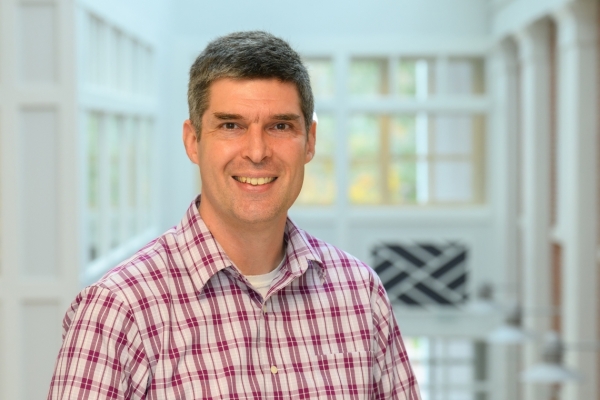
W&L’s Kyle Friend Presents Nobel Prize Symposium Talk Kyle Friend, associate professor of chemistry and biochemistry, will discuss this year’s Nobel Prize in Physiology and Medicine on Nov. 8 in Leyburn Library’s Harte Center.
Kyle Friend, associate professor of chemistry and biochemistry at Washington and Lee University, will present on the 2023 Nobel Prize in Physiology and Medicine awarded to Katalin Karikó and Drew Weissman for their discoveries concerning nucleoside base modifications that enabled the development of effective mRNA vaccines against COVID-19. The talk will be held on Wednesday, Nov. 8 at 12:15 p.m. in room 128 of the Harte Center, located in Leyburn Library.
“Based on their work, mRNA vaccines were clearly the best choice if speed mattered,” said Friend. “It is amazing good fortune that Karikó and Weissman did this work to hasten vaccine development prior to the time when new vaccines were desperately needed during COVID.”
The breakthrough for the mRNA vaccine occurred many years before the COVID-19 pandemic, when Karikó and Weissman noticed inflammatory responses in the body when in vitro transcribed mRNA was introduced as a vaccine. In contrast, RNA introduced from pseudouridine, a naturally occurring modification to mammalian cells, did not create an inflammatory reaction. As a result, they investigated with different variants of mRNA, each with unique chemical alterations in their bases, which they delivered to dendritic cells. Dendritic cells were used since they are the immune cells that are specialized for presenting foreign antigens to the immune system. The striking results indicated that the inflammatory response was almost completely eliminated when base modifications were included in the mRNA.
This research produced a drastic change in the scientific community’s understanding of how cells recognize and respond to different forms of mRNA. Karikó and Weissman immediately understood their discovery had profound significance for using mRNA as a vaccine. The results of these breakthroughs were published in 2005, a full 15 years before the COVID-19 pandemic.
Karikó earned a Ph.D. from the University of Szeged in Hungary, and over the years, she has performed postdoctoral research at the Hungarian Academy of Sciences, Temple University and the University of Health Science. She later became vice president and senior vice-president of BioNTech RNA Pharmaceuticals, and since 2021, she has been a professor at the University of Szeged and an adjunct professor at the University of Pennsylvania.
Weissman garnered an M.D. and Ph.D. from Boston University, with clinical training at Harvard Medical School and postdoctoral research at the National Institutes of Health under the direction of Anthony Fauci. He established a research group at the University of Pennsylvania, where he is the Roberts Family Professor in Vaccine Research and Director of the Penn Institute for RNA Innovations.
Learn more about all of the 2023 Nobel Prize winners here.
 Kyle Friend, associate professor of chemistry and biochemistry
Kyle Friend, associate professor of chemistry and biochemistry
You must be logged in to post a comment.